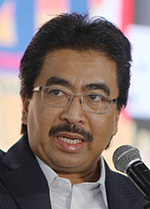Minister says move is to ensure donations are used only for religious purposes

Datuk Johari Abdul Ghani
KUCHING: The amendment to Income Tax Act 1967 is to mend a loophole in the act to ensure religious bodies will not use the contributions from donors to gain profit from business activities while enjoying free tax.
Minister of Finance II Datuk Johari Abdul Ghani, in stating this, said a system is needed to ensure all public donations are used solely for religious purposes and be subjected to tax if business activities were involved.
“Based on Inland Revenue Board (IRB) experience, many of these religious bodies are actively involved in investment and some of them frequently buy and sell properties by using the religious bodies’ funds.
“They earned huge profits and some of them are paying huge allowances to the committees. We just need to have a system to safeguard all the public donations to ensure they are used solely for religious purposes and not for profit making,” Johari told Oriental Daily yesterday.
He stressed that if incomes were used for profit-making then such investment income should be properly taxed.
He gave assurance that in as far as donations from the public are concerned, they would remain tax exempt.
“They can make a lot of money from donations, there is no problem. We are not going to tax them. But we want all that money to be used strictly for religious purposes and not for investment. If they do, then those incomes from investment need to be taxed,” he said.
He added that prior to the amendments to ITA 1967, there was no clear definition on how religious bodies should use their donations, saying the amendments would help to scrutinise how the donations were being used.
“This is not a new act, but just to mend a loophole,” he said.
Johari added that besides incomes from businesses or rental, profits from sale and purchase of properties are also subject to tax.
“If the purchase of the property is not for religious purpose then whatever profit that they make from disposal will be taxed as per the Income Tax Act,” he said.
To illustrate his point, he said rental income derived from properties bought by religious bodies using funds from public donations would be taxed.
“It’s very simple. If you collect public money that money must be used for religious purpose. If you used that money for investment then such investment income will be taxed. Not the principal investment but the profit of the investment.”
He warned that IRB could easily detect if contributions were used to buy properties for rent or for commercial operations or used to buy shares.
Meanwhile, in a WhatsApp message to The Borneo Post yesterday, IRB confirmed that “only income from business or rental are income taxable under Act 53 and are outside the scope of income which is exempted under Schedule 6”.
A tax consultant when contacted said based on the interpretation of the proposed amendment, all incomes or contributions are taxable if not used for charitable purposes.
In order to make it clear and precise, he suggested that the words ‘other than business, rental and interest income’ be inserted after the word ‘income’ and there is no need to add the words ‘in respect of contribution received for charitable purposes in the basis period for a year of assessment’.
Based on the consultant’s suggestion, Schedule 6 Para 13 (b) should be:
13. The income, other than business, rental and interest income, of –
(b) a religious institution or organisation provided such institution or organisation is not operated or conducted primarily for profit and is established in Malaysia exclusively for the purpose of religious worship or the advancement of religion.
The tax consultant believed that there is a need for IRB to confirm and issue Public Ruling for clarification to prevent being penalised arbitrarily later.
When contacted, Johari told The Borneo Post that the IRB is very clear in their interpretation.
“The religious bodies concerned can write to IRB and they (IRB) will reply them,” Johari said.
On Tuesday, IRB issued a statement to confirm that effective Jan 2017, religious bodies need to pay tax for their incomes derived from businesses or rental.
IRB justified that the amendment to paragraph 13(1)(b) of Schedule 6 Income Tax Act 1967 (Act 53) in Budget 2017 seeks to provide clarity of the law on the application of exemption to religious institutions or organisations.
“Prior to this amendment, there has been some confusion among taxpayers as to whether or not religious institutions or organisations
automatically qualify for the exemption under 13(1)(b) Schedule 6 or are required to obtain approval from the director general of Inland Revenue under Section 44(6) Act 53,” it added.
The amendment to the Income Tax Act was passed by the Senate on Dec 16 with no objections from both sides of the political divide. The amendment was passed in Parliament on Nov 23.
